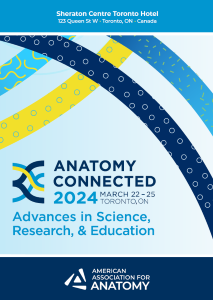Anatomy Education: Technology-Assisted Learning Posters
Poster: Anatomy Education: Technology-Assisted Learning Posters
160 - Bridging the Gap: Integrating Anki Spaced Repetition Study Cards into Medical Education for Enhanced Learning and Wellness
Monday, March 25, 2024
10:15am - 12:15pm US EDT
Location: Sheraton Hall
Poster Board Number: 160
There are separate poster presentation times for odd and even posters.
Odd poster #s – first hour
Even poster #s – second hour
Co-authors:
There are separate poster presentation times for odd and even posters.
Odd poster #s – first hour
Even poster #s – second hour
Co-authors:
Karen Pinder, PhD - Course Director and Teaching Professor, Department of Cellular & Physiological Sciences | Faculty of Medicine, University of British Columbia

Anika L. Todd, MSc, BSc
Student
University of British Columbia
Langford, British Columbia, Canada
Presenting Author(s)
Abstract Body : Introduction and Objective: As technology permeates medical education, this study addresses the underutilization of online resources, particularly Anki, in medical school curricula. The objective is to introduce Anki spaced repetition study cards into the histopathology curriculum at the University of British Columbia Medical Undergraduate Program, aiming to enhance learning efficiency and overall student wellness.
Materials and Methods: We collaboratively developed a series of Anki study cards mapped to the curriculum's learning objectives, ensuring accuracy through review by the course director. This study encompasses first- and second-year medical students from the class of 2026 and 2027 at the University of British Columbia. A Qualtrics-based survey assesses study habits, resource utilization, performance outcomes, anxiety, and imposter syndrome experiences. Thematic analysis will be employed to extract insights from the collected data.
Results: While data collection is ongoing, initial feedback from student stakeholders is positive, indicating a favorable reception of the Anki study cards. Thematic analysis results will refine existing resources and guide future developments. Preliminary findings suggest the potential positive impact of specific study resources on medical student anxiety and imposter syndrome during preclinical years.
Conclusion: This initiative marks a proactive step toward leveraging technology for enhanced medical education, with preliminary results showing promise. The study's conclusion aims to clearly communicate the positive impact of Anki study cards on student learning and well-being, aligning with the study objective.
Significance/Implication:This study contributes to the effective integration of digital resources in medical education, addressing challenges such as content misalignment and disparities in access when students rely on open source or peer shared resources. The significance lies in promoting student well-being and providing insights for medical schools to optimize learning environments in the digital post-pandemic era. Future work may focus on broader implementation and continuous improvement of digital tools in medical curricula.
Funding Sources: This study was conducted without external funding, relying on the collaborative efforts of the research team and the support of the UBC Medical Undergraduate Program.
Materials and Methods: We collaboratively developed a series of Anki study cards mapped to the curriculum's learning objectives, ensuring accuracy through review by the course director. This study encompasses first- and second-year medical students from the class of 2026 and 2027 at the University of British Columbia. A Qualtrics-based survey assesses study habits, resource utilization, performance outcomes, anxiety, and imposter syndrome experiences. Thematic analysis will be employed to extract insights from the collected data.
Results: While data collection is ongoing, initial feedback from student stakeholders is positive, indicating a favorable reception of the Anki study cards. Thematic analysis results will refine existing resources and guide future developments. Preliminary findings suggest the potential positive impact of specific study resources on medical student anxiety and imposter syndrome during preclinical years.
Conclusion: This initiative marks a proactive step toward leveraging technology for enhanced medical education, with preliminary results showing promise. The study's conclusion aims to clearly communicate the positive impact of Anki study cards on student learning and well-being, aligning with the study objective.
Significance/Implication:This study contributes to the effective integration of digital resources in medical education, addressing challenges such as content misalignment and disparities in access when students rely on open source or peer shared resources. The significance lies in promoting student well-being and providing insights for medical schools to optimize learning environments in the digital post-pandemic era. Future work may focus on broader implementation and continuous improvement of digital tools in medical curricula.
Funding Sources: This study was conducted without external funding, relying on the collaborative efforts of the research team and the support of the UBC Medical Undergraduate Program.

